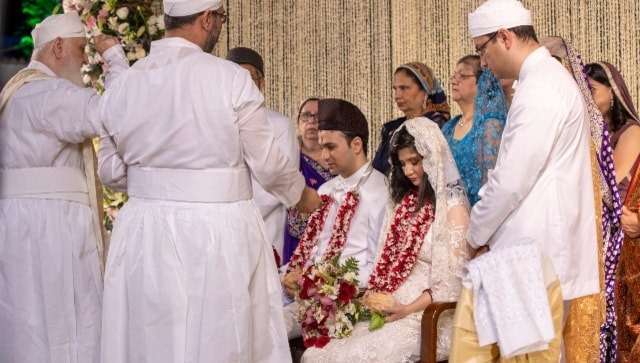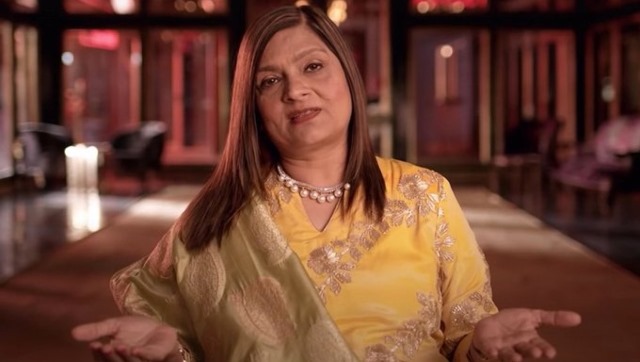Most Parsi matchmakers maintain Excel sheets or handwritten diaries of profiles and a collection of bio-datas. They don’t advertise their services at all; it is word of mouth or social media chatter that does the job.
Article by Huzan Tata | Firstpost
“Sima Taparia from Mumbai” is the phrase that went viral as soon as the series Indian Matchmaking dropped on Netflix last month. ‘Regressive’, ‘casteist’ and ‘sexist’ are just a few terms people used to describe the show that gives a glimpse into Taparia’s life as a matchmaker, as she jetted across countries in an attempt to find suitable matches for her clients. But despite the criticism the show and the institution of arranged marriage faces today, matchmakers seem to be a blessing in disguise for a small populace that is almost on the brink of extinction.
Sima Taparia, the matchmaker featured in Indian Matchmaking. Twitter
Parsis, who settled in India from the eighth century onward, are a community who find their religious roots in Iran, and are followers of Zoroastrianism. On landing on Indian shores, the Parsis – and Iranis who arrived in later centuries – soon assimilated with South Asian society, before many spread their wings to move abroad in the 1960s and ’70s. Today, their ilk struggles with a number of issues – late marriages due to the difficulty of finding a partner; the reluctance or inability to have children; conversion not being permitted by their religion; and the chief demographic being above 60, all major reasons for their dwindling numbers. There are just over a lakh Zoroastrians left in this world, or maybe even less.
But Parsi matchmakers are making their own attempts to help delay this decline.
Known as ‘kaajwaalis’ in the olden days – ‘kaaj’ being the Parsi Gujarati word for ‘match’ – who, like Taparia, had a hands-on role in getting families and couples to meet and advise them on prospective partners, today’s Parsi matchmaker has taken on the role of a facilitator. Most maintain Excel sheets or handwritten diaries of profiles and a collection of bio-datas – details of each potential bride or groom that includes personal, family and career descriptions, hobbies, and preferences for a partner – that they share with men and women who register with them. “I collect basic information on email, and have a huge database of prospective youngsters. Once every few months, I mail people registered with me a list of these names suitable to each one’s age and qualifications. It’s entirely up to them to contact whoever they think would be a good match. I just create a platform for youngsters to get to know each other. This is my small contribution towards my beloved community, I don’t want any compensation for it,” says Mumbai-based matchmaker Zarin Havewala who has been practicing for ten years. Due to her efforts, she has seen an average of eight to nine matches in a year since she started.
Like Havewala, almost all Parsi matchmakers provide their services free of cost, simply to encourage intra-community marriage at a time when their global population is endangered. Most of these women don’t advertise their services at all; it is word of mouth or social media chatter that does the job.
***
Since most Parsis are scattered around the world and are already scarce in number, many do not get a chance to even know of others of the same community in their usual social and work circles. “The key is to find ways for our singles to meet – be it at youth congresses, seminars, trips, camps and social media, or introductions by an old-fashioned matchmaker like me,” says Roshan Rivetna of Chicago, who also runs the matrimonial section of the FEZANA (Federation of Zoroastrian Associations of North America) Journal of which she has been editor in the past. “I would never consider charging for these services – I am more than amply rewarded when a match is made,” she adds. She’s helped around 75 people find their partners since she began this work in 1991, but feels like that isn’t enough. “My success rate is not as high as I would like.”
Many Parsis though, owing to their Westernised and relatively modern worldviews, are wary of arranged marriages, with many not considering it as a way to find a spouse. “There’s a misconception that in arranged marriages you see someone today and are engaged tomorrow, or that parents have the main say. No, I think couples should take their time to get to know one another. It’s important to meet and know someone’s family and lifestyle properly before taking the plunge,” explains Kamal Karanjia, a matchmaker based in Mhow, Madhya Pradesh who has clients across the world, from New Zealand to Canada.
“Nowadays, I find that some youngsters are hesitant about being introduced by an old lady like me – they are instead looking for that ‘spark’ or ‘vibe’. I tell them that sparks can come after marriage too – you have to work hard together to find it and make it grow into an enduring and loving marriage,” says Rivetna.
It’s not just the ‘spark’ they’re looking for that turns Parsis away from the world of arranged marriages. The Netflix series showcased many participants rattling off qualities and traits they desired in a partner that viewers found problematic, like “fair-skinned” and “mentally and physically attractive” to even “girl must be over 5’3″” and “flexible” – the last two being a lady’s criteria for her potential daughter-in-law. But Parsi matchmakers are not usually plagued with such requests. Although some families believe in horoscopes and reject good matches based on the stars, and a few may have requests based on superficial qualities (Karanjia has rejected bio-datas or stopped working with people if she feels that they aren’t too serious about the process), most seem to have a good head on their shoulders.
“I’m happy to say that most of the time, our young have their priorities right – focusing on education, profession, family, and to a lesser extent on looks and fair skin,” Rivetna, mentions. Karanjia too, whose list of bio-datas includes those of people even in their 40s and 50s, adds, “Some Parsi boys are less educated as compared to girls, but they still have the capability to rise. I tell people to look at the person’s nature and family background too.”
And most Parsis who do decide to go through the matchmaking route seem to understand this well.
Khushnaz Appoo, who was 26 when she registered with Havewala and found her match within three months, says “I was quite open to the thought of meeting my partner this way. I was just searching for someone who was mature and financially stable.” Her husband Adil, who took almost five years to find a life partner after registering, said he never had any specific requirements when looking for a spouse. “There were rejections throughout the process, but I always believed that someone was waiting for me. The day I met Khushnaz, I had a positive feeling about her. It was worth the five year wait.” The couple dated for ten months, mentioning that they initially took it slow and didn’t want to rush into marriage.
Similarly, US-based Gave and Sanaiya Poonawala, who met through Rivetna and have been married since 2017, viewed the process positively. “The main takeaway I have had through working with a matchmaker was that as you meet people with different perspectives and backgrounds, it helps you to reflect on what you want for now and for the distant future, the limits of compromises that you will be able to make, and values you wouldn’t cross over,” says Sanaiya.
Ultimately, these Parsi matchmakers are working towards one goal for nothing in return – to help people find worthy partners, who will together hopefully go on to start families of their own. What keeps these women going, one wonders? “I’m happy when couples show their gratitude for the hard work I do, for those who are total strangers to me. I don’t expect anything except a thank you, but some couples do send their wedding invitations or a box of sweets. That gives me a boost to continue doing this,” Havewala says.
“This is not a business for me. I do this work for the preservation of my community – that is my only aim,” concludes Karanjia, speaking for all the Zoroastrian matchmaking aunties.


